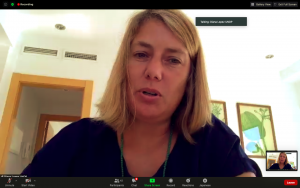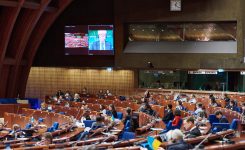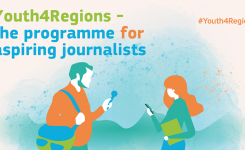Notizie
Webinar Aiccre, 3 giugno, Lopez: “ONU ed enti locali, un patto per la crescita”

Negli anni passati le Nazioni Unite insieme alle Associazioni ed alle reti di governi locali, hanno trovato un’intesa sui problemi che attanagliano le società e le economie contemporanee; un esempio potrebbero essere le difficoltà di molti cittadini nel trovare un lavoro decente, la crescente disuguaglianza che sbocca spesso in conflitti civili e esplosioni sociali, in un pianeta sottomesso a pressioni impossibili con un ambiente che ormai boccheggia: nel “mezzo del cammin delle nostre vite”, è arrivata anche la pandemia del Covid.
Nella nota concettuale gli organizzatori del webinar ci chiedevano di riflettere su quali erano le lezioni che avevano imparato le città dalla situazione legata alla pandemia e ho pensato alla nostra storia: mi sono venuti in mente molti riferimenti, che sentiamo in questi giorni, sull’influenza spagnola del 1918 e, come allora, che eravamo riusciti a risolvere la situazione sanitaria ma non quella sociale geo-politica, al punto tale che soltanto vent’anni più tardi abbiamo avuto la II guerra mondiale con ancora più morti dell’ l’influenza spagnola.
Adesso riusciamo a contenere la malattia, ma è arrivato il momento di far fronte alle sfide di questo secolo XXI. Gli organizzatori chiedevano, inoltre, di valutare quali strumenti specifici avessero gli enti locali e regionali per il post-Covid.
E volevo menzionare (come hanno fatto molti di noi nel corso del webinar) la stessa Agenda 2030 che rimane tuttora uno strumento fondamentale e a disposizione di tutti e che è oggi la risposta per risolvere molti dei problemi che si presenteranno nel futuro come la povertà, le disuguaglianze, l’ambiente.
Queste non sono questioni ideologiche di destra o sinistra, ma questioni universali contenute nei 17 obiettivi condivisi e approvati per tutti i paesi del mondo. E’ anche vero che le città, che sono ancora nelle trincee della risposta al Covid, hanno bisogno urgente di finanziamenti, di legislazione, di capacità, di flessibilità, di risorse umane, ma abbiamo anche bisogno di una narrativa politica di una risposta immediata perché, in questo momento storico, i cittadini ci stanno ascoltando e dobbiamo rispondere alle loro emergenze nel presente, ma senza dimenticare anche i bisogni del futuro e poi concludo già sugli strumenti specifici.
Le Nazioni Unite, attraverso il Segretario generale, hanno appena lavorato ad un documento di raccomandazioni sul tema specifico Covid e le Città che sarà disponibile nei prossimi giorni. E’ importante che il sistema Nazioni Unite si sia concentrato sull’importanza del ruolo delle città nella pandemia e abbia dedicato a questo tema un documento specifico tematico.
Gran parte delle raccomandazioni che include il Segretario generale in questo documento, sono questioni che i governi locali chiedono da tanto tempo, passando dalla collaborazione tra le amministrazioni, il bisogno di accesso ai finanziamenti, ma anche la partecipazione dei cittadini nelle decisioni e una maggiore trasparenza della gestione pubblica.
Nell’UNDP, che oggi rappresento qui, il Programma delle Nazioni Unite per lo Sviluppo, ci sono un gran numero di iniziative in corso, solo per menzionarne alcune, ovviamente i nostri uffici nei paesi di sviluppo hanno reagito velocemente con il sostegno ai sistemi sanitari, accesso all’acqua potabile, gestione della mobilità urbana che avevamo già pronti da epidemie come l’ebola qualche anno fa e stiamo anche lavorando, assieme a UN-Habitat, a un’analisi più specifica delle politiche pubbliche urbane, che le città di tutto il mondo stanno sviluppando, come gli esempi che sono stati menzionati oggi qui, e saranno messi a disposizione in una piattaforma urbana dell’UNDP e finalmente anche UNDP è stato incaricato di proporre la strategia di recupero socio-economico della post-pandemia e stiamo lavorando per assicurarci che la specifica dimensione urbana e il ruolo fondamentale dei governi locali e regionali, temi come la strategia di sviluppo locale (dobbiamo ritornare a parlare di sviluppo locale) e di un cambiamento di modello versato nella produzione e consumo e gli altri temi che sono già cari ai Comuni, siano presenti nella strategia globale del sistema delle Nazioni Unite.
Vorrei fare riferimento ad un documento che è stato appena pubblicato dall’UNDP che si chiama “A Leapfrog Mission”, tradotto in italiano “Una missione di salto di rana”, che punta su cinque fronti di azione: la protezione dei servizi di salute, l’espansione della protezione sociale dei servizi essenziali, la protezione del lavoro, delle piccole e medie imprese e le catene di approvvigionamento, rendere le risorse fiscali e finanziarie disponibili per la risposta e rafforzare la questione sociale e l’azione comunitaria. Cinque temi che sono stati quasi tutti già menzionati nel corso del webinar dai Sindaci italiani.
Siamo davanti ad un’opportunità storica per una ripresa verde che promuova utilizzi sostenibili, attenta al clima e di come è cresciuta in questi di pandemia giorni la violenza di genere, che ci mostra l’urgenza di affrontare le cause più profonde di questo terribile fenomeno. Il telelavoro, la teleistruzione e i pagamenti on-line stanno accelerando la rivoluzione digitale (che è anche un fattore di esclusione) e di come stiamo andando verso debiti pubblici ingestibili – si stanno verificando fughe di capitali e questa diminuzione del commercio a tutti i livelli – sono temi che minacciano la nostra ripresa e che vanno affrontati.
In past years, the United Nations, together with associations and networks of local governments, have found an agreement on the problems that affect contemporary societies and economies; an example could be the difficulties of many citizens in finding a decent job, the growing inequality that often leads to civil conflicts and social explosions, in a planet subjected to impossible pressures with an environment that is now gasping: in the “middle of the walk of our lives”, the Covid pandemic has also arrived.
In the conceptual note, the organizers of the webinar asked us to reflect on what lessons the cities had learned from the pandemic situation and I thought about our history: many references that we hear these days about the Spanish flu of 1918 and, as then, that we had managed to solve the health situation but not the geo-political social situation, to the point that only twenty years later we had World War II with even more deaths than the Spanish flu.
Now we are able to contain the disease, but the time has come to face the challenges of this 21st century. The organisers also asked for an assessment of what specific tools local and regional authorities had for post-Covid.
And I wanted to mention (as many of us did during the webinar) the Agenda 2030 itself, which is still a fundamental tool available to all and which is now the answer to solve many of the problems that will arise in the future such as poverty, inequality and the environment.
These are not ideological issues of right or left, but universal issues contained in the 17 objectives shared and approved for all the countries of the world. It is also true that the cities, which are still in the trenches of the Covid response, urgently need funding, legislation, capacity, flexibility, human resources, but we also need a political narrative of an immediate response because, at this historic moment, the citizens are listening to us and we must respond to their emergencies in the present, but without forgetting also the needs of the future and then I will conclude on the specific instruments.
The United Nations, through the Secretary General, has just worked on a document of recommendations on the specific theme Covid and Cities that will be available in the coming days. It is important that the United Nations system has focused on the importance of the role of cities in the pandemic and has dedicated a specific thematic document to this issue.
Most of the recommendations that the Secretary-General includes in this document are issues that local governments have been calling for for a long time, ranging from collaboration between administrations, the need for access to funding, but also the participation of citizens in decision-making and greater transparency in public management.
In the UNDP, which I represent here today, the United Nations Development Programme, there are a large number of initiatives underway, just to mention a few, of course our offices in developing countries have reacted quickly with support for health systems, access to drinking water, management of urban mobility that we had ready from epidemics like Ebola a few years ago and we are also working, together with UN-Habitat, on a more specific analysis of urban public policies, which cities around the world are developing, like the examples that have been mentioned here today, and will be made available in an urban platform of the UNDP and finally UNDP has also been charged to propose the strategy for socio-economic recovery of the post-pandemic and we are working to ensure that the specific urban dimension and the fundamental role of local and regional governments, issues such as the local development strategy (we must return to talk about local development) and a change of model poured in production and consumption and other issues that are already dear to the municipalities, are present in the global strategy of the United Nations system.
I would like to refer to a document that has just been published by the UNDP called “A Leapfrog Mission”, which focuses on five fronts of action: the protection of health services, the expansion of social protection of essential services, the protection of labour, small and medium-sized enterprises and supply chains, making fiscal and financial resources available for the response and strengthening the social issue and community action. Five themes were almost all mentioned during the webinar by the Italian Mayors.
We are facing an historic opportunity for a green recovery that promotes sustainable, climate-friendly uses and how gender-based violence has grown in these pandemic days, which shows us the urgency of addressing the root causes of this terrible phenomenon. Telework, tele-education and online payments are accelerating the digital revolution (which is also a factor of exclusion) and how we are moving towards unmanageable public debts – there are capital leaks and this decline in trade at all levels – are issues that threaten our recovery and need to be addressed.







